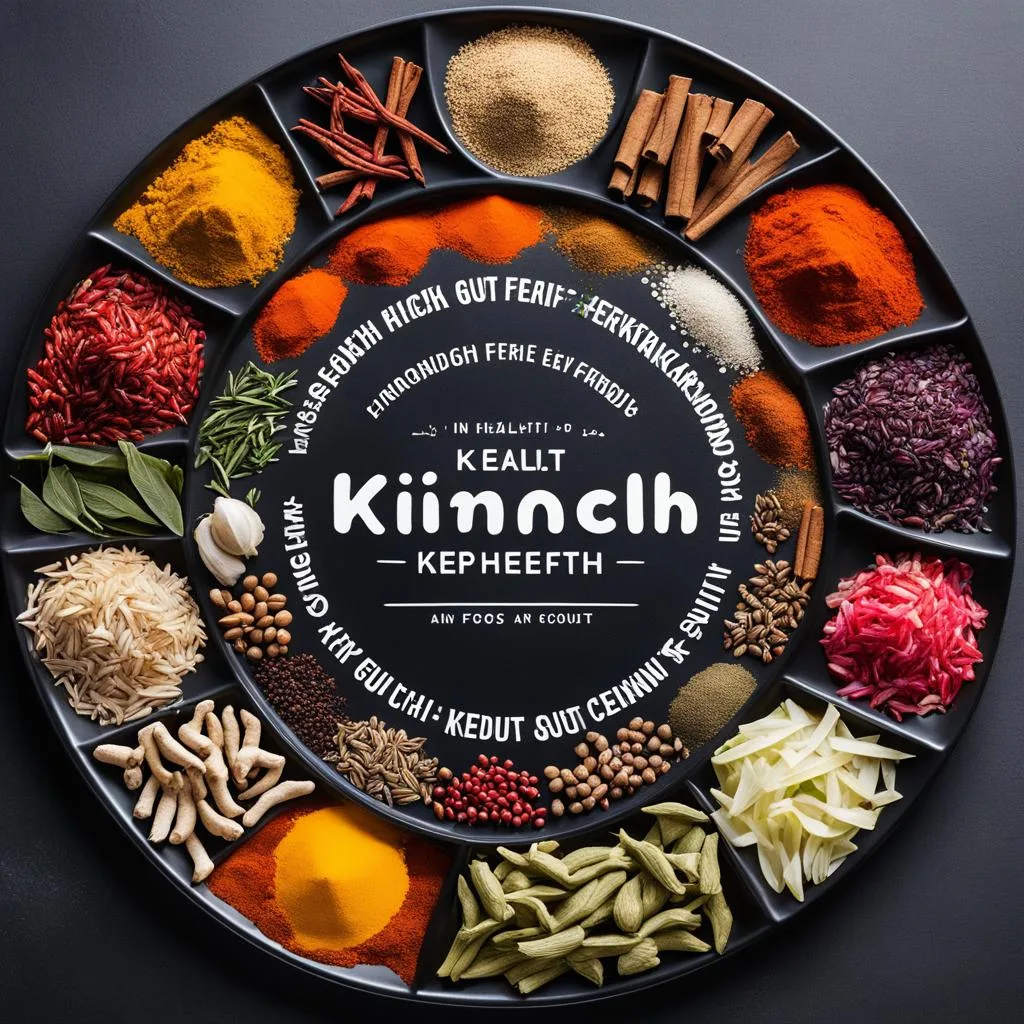Gut health is crucial to our overall well-being. It affects our digestive health, immune system, and even our mental health. Incorporating gut-friendly foods into our diet can aid in healing the gut, reducing inflammation, and promoting overall digestive wellness. In this article, we will explore the power of spices in enhancing gut health and share some tips on how to incorporate these spices into your diet.
Key Takeaways:
- Spices can positively impact gut health by reducing inflammation and supporting gut healing.
- Turmeric, cumin, ginger, cinnamon, fennel seeds, and black pepper are all gut-friendly spices that can be easily incorporated into your diet.
- A gut health diet should focus on incorporating whole, nutrient-dense foods and reducing processed foods and sugar.
- Incorporating more gut-friendly foods and spices into your diet can help promote a healthy gut microbiome and gut-brain axis.
- Remember to listen to your body and make dietary changes gradually to support long-term gut health.
Understanding Gut Health and its Importance
Before we explore the impact of spices on gut health, it’s important to understand the significance of gut health. Our gut, or digestive system, plays a crucial role in our overall wellbeing. It not only breaks down food to provide essential nutrients to the body but also houses the gut microbiome, a complex community of trillions of bacteria that live in our intestines.
The gut microbiome influences various bodily functions, including metabolism, immune system, and brain function, through a series of chemical signals known as the gut-brain axis. Therefore, maintaining a healthy gut is vital for optimal digestive health and overall wellness.
Studies have shown that an imbalance in the gut microbiome, also known as dysbiosis, can lead to digestive issues such as bloating, constipation, and diarrhea, as well as chronic health conditions such as obesity, diabetes, and even mental health disorders.
Therefore, prioritizing gut health through a balanced gut-friendly diet, regular exercise, and stress management is crucial for a healthy and happy life.
The Impact of Spices on Gut Health
Spices not only add flavor and aroma to our meals but can also positively impact our gut health. They are rich in antioxidants and anti-inflammatory properties and can aid in reducing gut inflammation and promoting gut healing. Incorporating these gut-friendly foods in your diet can contribute to improving gut wellness.
The Science Behind Spice’s Benefits for Gut Health
Studies have shown that certain spices have beneficial effects on gut health. For example, turmeric, a spice commonly used in Indian cuisine, contains curcumin, an active component found to have anti-inflammatory and antioxidant properties. Cumin helps stimulate the digestive enzymes, promoting digestion, and reducing bloating. Ginger contains gingerol, which has anti-inflammatory properties that can soothe the digestive system and reduce gut inflammation.
Cinnamon is another spice that has been shown to positively impact gut health. It enhances gut flora diversity, which is essential for a healthy gut microbiome, and has prebiotic properties that stimulate the growth of gut-friendly bacteria. Fennel seeds are known for their carminative properties, which can reduce bloating and ease digestive discomfort. Black pepper, when consumed with other foods, can enhance nutrient absorption in the gut.
Spices with Gut-Healing Properties
| Spice Name | Gut-Healing Properties |
|---|---|
| Turmeric | Anti-inflammatory, Antioxidant |
| Cumin | Stimulates Digestive Enzymes, Reduces Bloating |
| Ginger | Anti-inflammatory, Promotes Gut Healing |
| Cinnamon | Enhances Gut Flora Diversity, Prebiotic Properties |
| Fennel Seeds | Carminative, Eases Digestive Discomfort |
| Black Pepper | Enhances Nutrient Absorption in Gut |
Incorporating these spices into your diet is a simple way to enhance your gut health and promote overall digestive wellness. Adding turmeric to curries and vegetables, sprinkling cumin on roasted vegetables and meats, using ginger for teas and soups, and using cinnamon in oatmeal and baked goods add flavor and benefits. Fennel seeds can be chewed after meals, and black pepper can be sprinkled into dishes.
Make sure to choose high-quality spices and use them in moderation as some may be potent and cause side effects when consumed in large amounts.
Turmeric: A Powerful Gut-Friendly Spice
If you’re looking to enhance your gut health, turmeric is one spice you won’t want to miss. Not only does it add vibrance and depth of flavor to dishes, but it also boasts powerful anti-inflammatory properties that can help to reduce gut inflammation and improve overall gut health.
Curcumin, the active ingredient in turmeric, has been shown to inhibit inflammation in the gut and reduce symptoms of inflammatory bowel disease (IBD), including Crohn’s disease and ulcerative colitis. This powerful spice has also been linked to improved gut flora diversity, which is critical for maintaining gut health.
Incorporating turmeric into your diet is easy and delicious. Try adding it to soups, curries, roasted vegetables, or smoothies for a flavorful kick that benefits your gut. You can even enjoy it as a warming tea by steeping turmeric and black pepper in hot water and adding a squeeze of lemon juice.

“Turmeric’s anti-inflammatory properties have been shown to reduce gut inflammation and improve overall gut health.”
Cumin: Supporting Digestive Wellness
When it comes to gut-friendly foods, cumin is a must-have spice in your kitchen pantry. Originating from India, cumin has been used for centuries in traditional medicine to aid digestion. Its distinct flavor and aroma can add depth to many dishes, from soups and stews to curries and roasted vegetables.
Cumin contains compounds that aid in digestion, reduce bloating, and support overall digestive wellness. According to research, cumin can help improve digestive symptoms, including bloating and flatulence, and promote regular bowel movements.
Looking to add more cumin to your diet? Try sprinkling ground cumin on roasted veggies, mixing it into hummus or guacamole, or add it to your morning smoothie for a flavorful and nutritious boost.
Cumin Nutritional Facts:
| Nutrient | Cumin (1 tbsp) | % Daily Value |
|---|---|---|
| Calories | 22 | |
| Protein | 1 g | 2% |
| Carbohydrates | 3 g | 1% |
| Fiber | 1 g | 4% |
| Fat | 1 g | 1% |
| Iron | 1.4 mg | 8% |
| Calcium | 37 mg | 4% |
| Magnesium | 22 mg | 6% |
Including cumin in your meals is an excellent way to improve digestive health and promote overall wellness. With its delicious and versatile flavor, cumin is an easy and nutritious addition to any diet.
Ginger: Soothing the Gut
Ginger’s anti-inflammatory properties have made this root a household name in many Indian households. The soothing properties of ginger can alleviate gut inflammation and can be used to treat various digestive issues. Ginger promotes gut healing and can also combat feelings of nausea by calming the stomach.
Incorporating ginger as a part of your gut health diet is simple. Add it to your morning tea or make a refreshing ginger lemonade to soothe your digestive tract. You can also add freshly grated or powdered ginger to your meals. Try fresh ginger in stir-fries or Indian curries like chana masala and chicken tikka masala. Ginger’s versatility allows it to be used in sweet and savory dishes alike.
Ginger Tea Recipe
Ginger tea is an easy way to add ginger to your diet. Here’s a quick recipe for ginger tea:
| Ingredients | Instructions |
|---|---|
| 1 tbsp grated or sliced ginger | Boil 2 cups of water in a saucepan. Add ginger and let it steep for 5-10 minutes. Strain and serve hot with honey and lemon, if desired. |
Ginger can be your gut’s best friend. Incorporate it into your meals and drinks to experience its positive impact on your gut health.
Cinnamon: Balancing Gut Microbiome
Cinnamon is more than just a delicious spice; it has numerous benefits for gut health as well. One of its key roles is balancing the gut microbiome. Studies show that cinnamon has antimicrobial properties, which means it can help to regulate the balance of bacteria in the gut.
Cinnamon can enhance gut flora diversity, which is important for maintaining a healthy gut microbiome. It can also reduce inflammation in the gut, contributing to overall gut health. Incorporating cinnamon into your diet can be as easy as adding a sprinkle to your morning oatmeal or mixing it with honey for a gut-friendly sweetener.

“Cinnamon is one of my go-to spices for gut health. It adds a delicious flavor to my meals while supporting a healthy gut microbiome.” – Sarah, Nutritionist
Fennel Seeds: Easing Digestive Discomfort
Fennel seeds have been used for centuries to aid digestion and ease digestive discomfort. These tiny seeds are packed with nutrients like fiber, calcium, and magnesium, making them an ideal addition to your gut-friendly diet.
Studies show that fennel seeds may help relieve bloating and flatulence, thanks to their carminative and anti-spasmodic properties. The essential oils found in fennel seeds can also stimulate digestion and promote the absorption of nutrients, further supporting digestive health.
One delicious way to incorporate fennel seeds into your meals is by using them to season roasted vegetables or grilled fish. You can also steep fennel tea by boiling the seeds in hot water for a soothing and fragrant beverage.
Fennel seeds are a perfect example of how simple additions to your diet can have a profound impact on your digestive health. By incorporating gut-friendly foods like fennel seeds into your meals, you can ease digestive discomfort and promote a healthy gut.
Black Pepper: Enhancing Nutrient Absorption
Black pepper is more than just a common seasoning. It contains an active compound called piperine that has numerous health benefits, including enhancing nutrient absorption in the gut. Piperine increases the bioavailability of several nutrients, including vitamins, minerals, and antioxidants, making them more readily available for the body to use.
When consumed with other gut-friendly foods, black pepper can further support a healthy gut microbiome and improve overall gut health. This spice also aids in digestion and reduces gut inflammation, contributing to a healthy gut.
There are endless creative ways to incorporate black pepper into your meals and reap its gut-boosting benefits. Sprinkle it on roasted veggies, add it to dressings and marinades, or use it to season meats and seafood. The possibilities are endless!
Conclusion
Incorporating gut-friendly spices into our diet is a simple yet effective way to promote gut health and overall well-being. By understanding the importance of our gut microbiome and the gut-brain axis, we can make informed choices when it comes to what we eat.
Through our exploration of turmeric, cumin, ginger, cinnamon, fennel seeds, and black pepper, we have uncovered the diverse benefits that these spices offer for gut health. From reducing inflammation to easing digestive discomfort, these spices have shown to be powerful gut healers.
We encourage you to experiment with incorporating these spices into your meals and experience the positive impact on your gut health firsthand. By prioritizing gut-friendly foods and making conscious choices, we can support our digestive system and overall health. Let’s unlock the potential of these healing spices in our kitchen and prioritize our gut wellness.
FAQ
How do spices improve gut health?
Spices have various benefits for gut health. Many spices have anti-inflammatory properties that can help reduce gut inflammation. They can also aid in gut healing and promote overall digestive wellness.
Which spices are known for their gut-friendly properties?
Several spices are known for their gut-friendly properties. Turmeric, cumin, ginger, cinnamon, fennel seeds, and black pepper are some examples. These spices have unique characteristics that can positively impact gut health.
How can I incorporate turmeric into my diet for gut health?
Turmeric can be added to dishes such as curries, roasted vegetables, smoothies, and golden milk. You can also take turmeric supplements if desired, but it’s always best to speak with a healthcare professional before starting any supplements.
What are the digestive benefits of cumin?
Cumin supports digestive wellness by aiding in digestion, reducing bloating, and promoting overall digestive health. You can use cumin in dishes like soups, stews, and roasted vegetables to enhance its flavor and reap its benefits.
How does ginger soothe the gut?
Ginger has soothing properties that can alleviate gut inflammation and help with gut healing. It can be consumed as fresh ginger, ginger tea, or added to dishes like stir-fries, smoothies, and baked goods to provide a flavorful kick.
How does cinnamon affect the gut microbiome?
Cinnamon has the ability to balance the gut microbiome by promoting gut flora diversity. You can incorporate cinnamon into your diet by adding it to oatmeal, yogurt, baked goods, and even savory dishes like roasted vegetables.
How do fennel seeds ease digestive discomfort?
Fennel seeds aid in digestion, relieve bloating, and promote overall digestive health. You can chew on a few fennel seeds after meals or incorporate them into dishes like salads, soups, and roasted vegetables to enjoy their benefits.
How does black pepper enhance nutrient absorption?
Black pepper contains piperine, a compound that enhances nutrient absorption. Adding black pepper to your meals can improve the absorption of nutrients, supporting a healthy gut. Use it in various dishes such as salads, marinades, and soups to enhance flavors while reaping its benefits.






